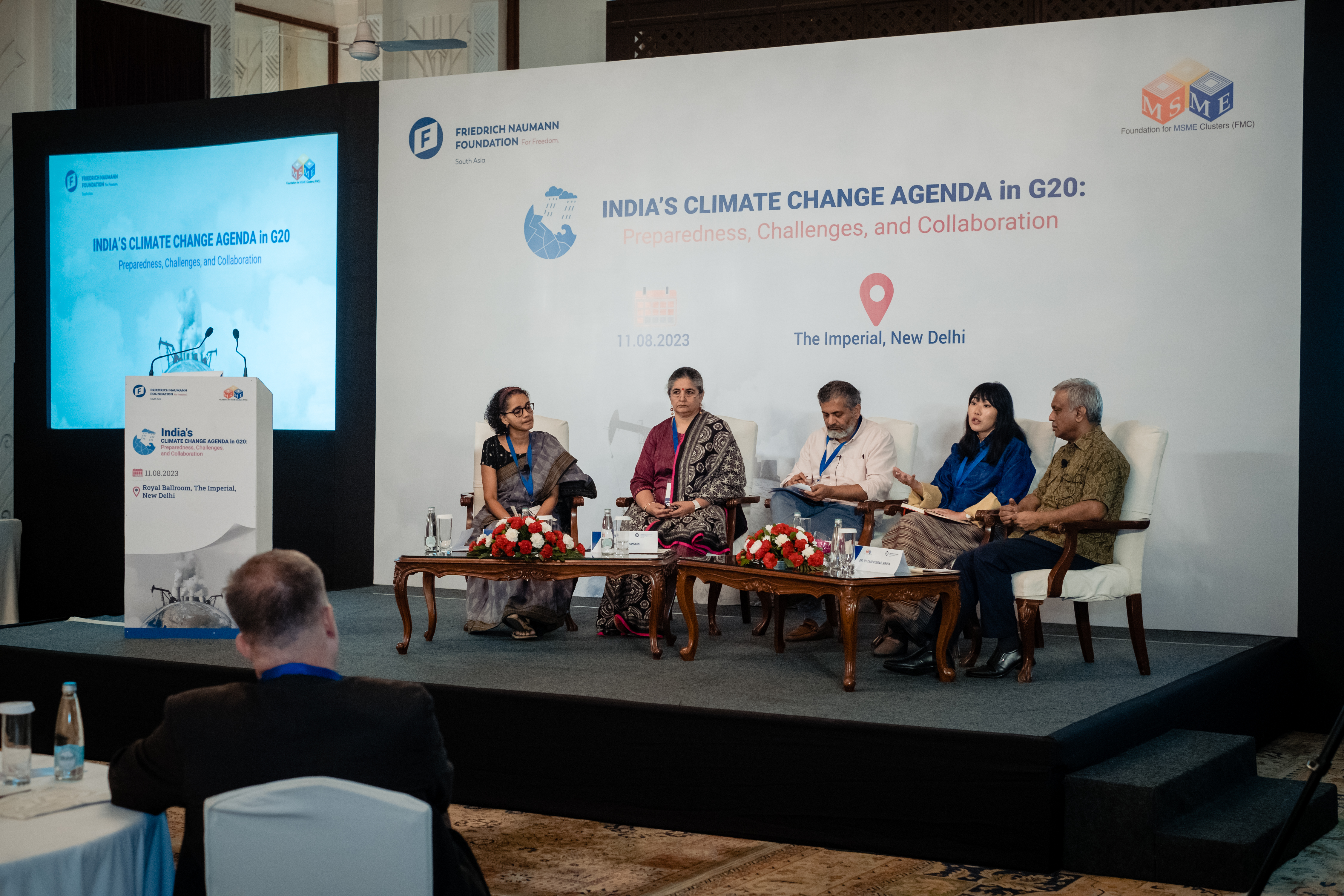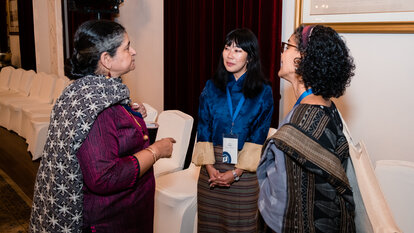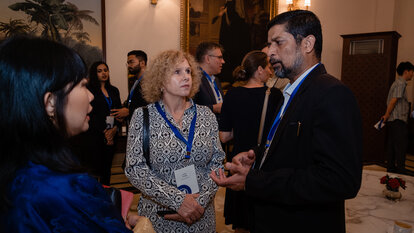Climate Change
Empowering individual accountability: Key to addressing climate change

India's Climate Change Agenda - Panel
© FNF South AsiaClimate change is a multidimensional global phenomenon that has multiple, differentiated and disproportionate effects on countries, regions and ecosystems, South Asia being one of the regions predicted to be the most impacted. Its vulnerability is evident, with coastal states such as the Maldives, Bangladesh, India, Pakistan and Sri Lanka threatened by rising sea levels and flooding. Similarly, landlocked countries like Afghanistan, Bhutan and Nepal are grappling with rising temperatures, droughts and melting glaciers.
Despite these vulnerabilities, there is a lack of a concerted effort from South Asian countries to address the challenges posed by climate change. In this context, India’s effort to streamline the discussion into the G20's proceedings is a proactive effort that has presented it with an important opportunity to lead the discussion, campaign for climate multilateralism and posit itself as a norm-setting country. India, in its G20 presidency, has prioritized green development, climate finance and technology transfer as the primary areas of discussion.
With the G20 summit approaching in September, the panel discussion on ‘India's Climate Change Agenda in G20: Preparedness, Challenges, and Collaboration,’ organized by the Friedrich Naumann Foundation in collaboration with the Foundation for MSME Clusters (FMC), is very contextual. The panel discussion shed light on multifaceted aspects of the debate around climate change, the discourse ranging from its effects on the indigenous communities to the question of corporate responsibility and from India’s climate preparedness to its effort to integrate South Asian issues into the G20's agenda.
Multiple perspectives on the issue, the economic and socio-political implications of mitigation and adaptation strategies and North–South politics complicate the addressal of climate change. Global North nations attribute the climate crisis to unsustainable practices by Global South countries and stress equal mitigation efforts. In contrast, Global South nations view climate change as stemming from historical emissions and consumerist lifestyles in developed countries. They emphasize differentiated responsibilities and seek aid and technology transfer for support. The intricate nature of this disparity highlights the challenge inherent in achieving a cohesive approach to addressing global climate change concerns.
Nonetheless, the matter of climate change transcends North–South political dynamics and resonates as a tangible experience with each South Asian nation. Irrespective of external assistance, these nations have to establish policies, arrive at a state of readiness to mitigate climate change impacts and educate their citizens about sustainable development practices, a view that was the focal point of the panel's discussion. Panellists also deliberated on the importance of learning adaptation techniques, adopting policies of recycling and sustainable development, prioritising climate change in the national budget allocation, investing in climate change education and research, changing lifestyles, empowering local communities and making the corporate sector assume responsibility in tackling the impact of climate change.
Panellists from diverse sectors offered valuable insights on elements crucial to mitigating impacts and adapting to changing circumstances. Dr. Vikas Goswami of Boundless Environment Resource Solutions stressed the importance of increasing corporate social responsibility funds for addressing climate change whilst advocating for the adoption of the Iceland model, which promotes mandatory recycling. Similarly, Dr. Uttam Kumar Sinha from the Manohar Parrikar Institute for Defense Studies and Analyses (IDSA) highlighted the necessity for a shift in mindset and the imperative of working together at global, national and sub-national levels. Meanwhile, Dr. Manju Vasudevan from the River Research Centre underscored the valuable lessons that can be gleaned from Indigenous communities, aiding in the creation of climate-resilient livelihoods. Ms. Namgay Choden, representing the Bhutan Ecological Society, directed attention towards the pivotal role that youth play in mainstreaming climate change efforts.
The conversation largely highlighted the accountability of individual citizens, stressing that addressing climate change should not be perceived solely as a governmental duty. It also paved the way for further avenues for debate and discussion and emphasized rather the collaborative approach to address this transnational security threat.

India's Climate Change Agenda - Panellists
© FNF South Asia
India's Climate Change Agenda - Event Photo
© FNF South AsiaEvent Highlights
🌍 Dive into the highlights of our remarkable event in collaboration with Foundation for MSME Clusters on August 11, 2023. Our focus was India's Climate Change Agenda in G20: Preparedness, Challenges, and Collaboration! 🌊 During this enlightening seminar, we embarked on a deep exploration of India's climate change journey. Our discussions were enriched by insights from esteemed speakers: 🔹 Dr. Carsten Klein, Head, Regional Office Friedrich Naumann Foundation For Freedom South Asia - Welcome Remarks 🔹 Dr. Benno Boer, UNESCO New Delhi - Keynote Address 🔹 Dr. Laveesh Bhandari, Centre for Social and Economic Progress - Moderator 🔹 Dr. Uttam Sinha, MP-IDSA - Speaker 🔹 Ms. Namgay Choden, Bhutan Ecological Society - Speaker 🔹 Ms. Vikas Goswami, Boundless Environment Resource Solutions Pvt. Ltd. - Speaker 🔹 Dr. Manju Vasudevan, Forest Post - Speaker 🔹 Mr. Mukesh Gulati, Foundation for MSME Clusters - Vote of Thanks Together, we delved into India's climate readiness, challenges, and the power of global collaboration. Our efforts echo South Asian voices for impactful climate action, driving us toward a greener, more resilient future. Stay tuned for more details and follow our journey. #ClimateAction #SeminarHighlights #SustainableFuture #TogetherForChange #G20India #G20 #G20Summit2023 #GreenFuture 🌏🌱
© FNF South Asia